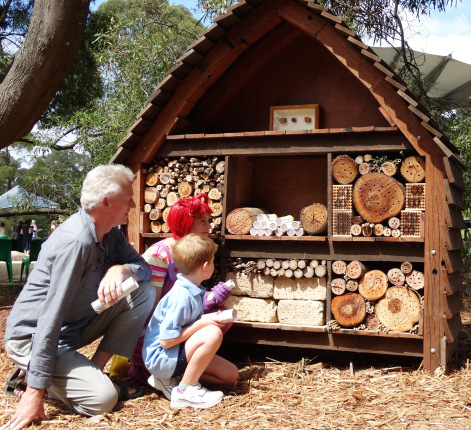
Bee Heaven B&B at the National Botanic Gardens Canberra
February 11, 2016The Gigantic Hive at Kew Gardens
June 20, 2016Chalkbrood controlled: Apprentice beekeeper stumbles on solution to disease wreaking havoc in Alice Springs

NT COUNTRY HOUR BY NATHAN COATESUPDATED WED JUN 15 13:47:42 EST 2016
Common bee disease Chalkbrood has spread throughout Alice Springs
NATHAN COATES
A novice beekeeper in Alice Springs has stumbled upon a solution to a disease that has been devastating Red Centre hives.
Last month ABC Rural reported on chalkbrood disease.
At the time the most experienced apiarist in Alice Springs, Russell Wilson, reported that his honey yield had been cut by 80 per cent and that the CSIRO had been involved to identify the problem.
It turns out that Mr Wilson’s apprentice Marita Thompson has almost eradicated chalkbrood throughout her hives after only three months experience caring for bees.
Chalkbrood is a disease caused by a fungus and results in mummified bee larvae.
“Bee-eater birds were eating my bees and we had found chalkbrood at the front of the hives,” she said.
“One night I thought bugger the birds and I put the bees in the chook pen.
“I didn’t think anymore of it but then noticed over a few weeks that I was getting very little chalkbrood.”
Ms Thompson said she was also feeding the bees frozen and unpeeled bananas coated with icing sugar.
She said she put her chalkbrood reduction down to putting the bees in the chook pen and feeding them bananas.
“The bees are undercover and the chooks are eating the chalkbrood,” she said.
“With the bananas I believe they help the bees like an antibiotic but I am only assuming as I don’t have any technical background regarding it.”
Northern Territory Government biosecurity officer Vicki Simlesa said “bananas release methane when breaking down which in turn could be interfering with the chalkbrood process.”
“Bananas are known as fruit not to take on a long journey as they break down easily and emit gas that causes other organic matter to deteriorate,” she said.
“In addition – and it could be combination of both -, when the bees eat the banana skin they increase their protein intake which boosts up immunity and general health.”
Ms Simlesa has previously told ABC Rural that chalkbrood is spread by drone bees from other hives and can be controlled by reducing stress and improving hygiene and nutrition.
POSTED WED JUN 15 12:21:51 EST 2016
http://mobile.abc.net.au/news/2016-06-15/apprentice-beekeeper-stumbles-on-solution-to-disease/7511830

 , and they can appear at the front of the hive as small chalky white or black capsules.
, and they can appear at the front of the hive as small chalky white or black capsules.